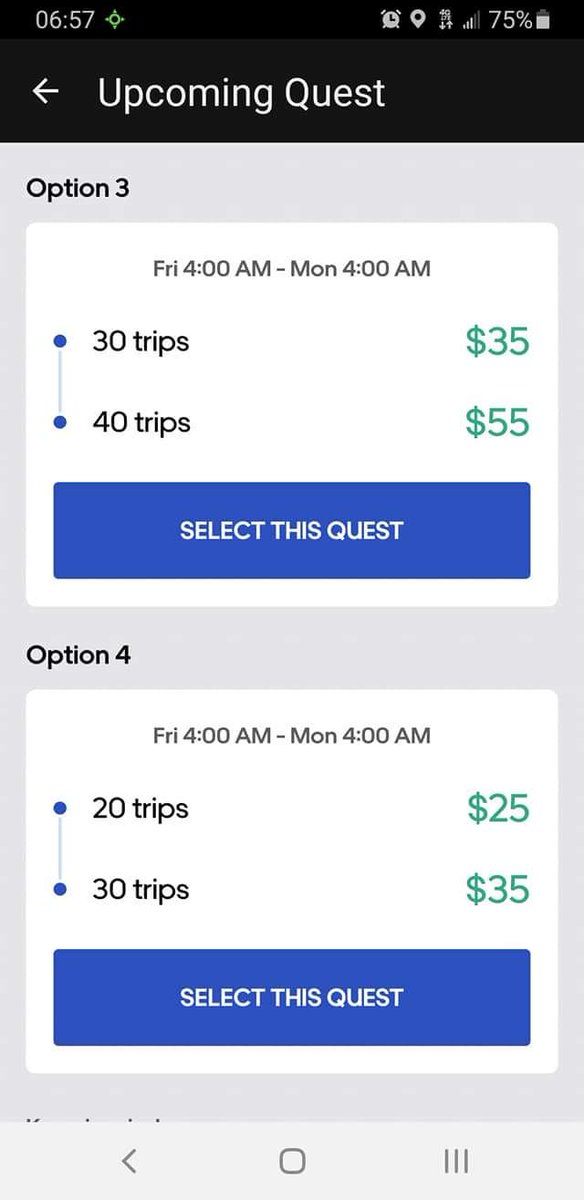Let's talk about gamification for rideshare and what it looks like for drivers. If you don't know the term, gamification means turning something into a game to keep people's attention. For rideshare apps, its main purpose is to keep drivers driving.
I'm mostly going to talk about Uber in this thread, but be aware that Lyft does stuff like this too. Lots of apps do, but it's particularly insidious on Uber. Here's an example I was presented with a few days ago: Choose Your Quest!
Quests are what Uber calls a bonus paid to drivers for doing a certain number of rides. The point is to keep you on the road until you hit a certain number. While some of the bonuses look huge, they are for numbers of rides that are impossible. Drivers average 2-3 rides per hour.
To earn the maximum bonus ($125), a driver would have to work 20-30 hours. Keep in mind that this largest bonus amounts to a mere $2 extra per ride. Meanwhile, the promise of this bonus will lure drivers onto the road, reducing the possibility of a surge.
Surges are where drivers make good money, when rides are priced higher and a portion of the higher price is passed to the driver. Unfortunately, Uber has a nasty habit of charging riders a surge while withholding it from drivers. These screenshots are from a local Facebook group.
The bonus you see on the driver's side is a "consecutive ride" bonus, another way of gaming drivers. to get the bonus, which amounts to a mere dollar and change on each ride, drivers must accept any ride offered to them. You give up control in exchange for a pittance.
There are other, more subtle ways. Uber puts drivers into a rewards program which gives them ranks based on how many points they earn by driving. Every ride is worth one point, unless it's during peak hours, when it's worth three. These points translate to benefits.
Most of the benefits are useless, discounts on services that are overpriced to begin with. The most valuable one is unlocked at gold tier, when you are allowed to see the direction and distance of the ride before accepting it. Before you unlock this, that information is hidden.
Some states have passed regulation that force Uber to show this to drivers. Outside of these states, the knowledge is treated as a privilege to be earned. The result is that your driver is guessing in the dark about their possible earnings for each ride.
Even with this information, if your cancellation rate or acceptance rate gets too low, Uber will suspend your unlocked privileges, punishing you for exercising any will that defies their desire that you keep driving no matter what.
The point screen also serves another purpose, because your app defaults to that view after each ride. Notably, the app does not default to your earnings, hoping that you will not look at it and keep driving.
Information about earnings is also hidden in other ways. During a ride, drivers cannot access the earnings screen. The app will not let you. If you stack rides one after another, then the next ride begins as soon as you drop off the first person, preventing you from looking.
Of course, you could always set the app to stop offering you rides and sign you off after your current ride, but then you would lose your consecutive ride bonus, and a helpful screen will ask if you're really sure you want to do that.
Most hated by me is the earnings reminder that pops up if you log off. Sign off with $100 earned, and a helpful reminder appears to tell you that you made $121 by this time last week. Don't you want to keep going? If you've made more, it encourages you to keep it up.
The point of all the hidden information and subtle encouragement is to keep you clueless, confused, and unable to turn down a ride. This is what Uber actually wants, not a fleet of independent drivers, but confused digital serfs to whom they owe nothing and take from freely.
I could go on about this for a hundred tweets, but I think the point has been made. Companies use small methods to psychologically manipulate drivers into working more and more while providing only fractional compensation compared to their benefit. It's a game, and you're a mark.

 Read on Twitter
Read on Twitter






